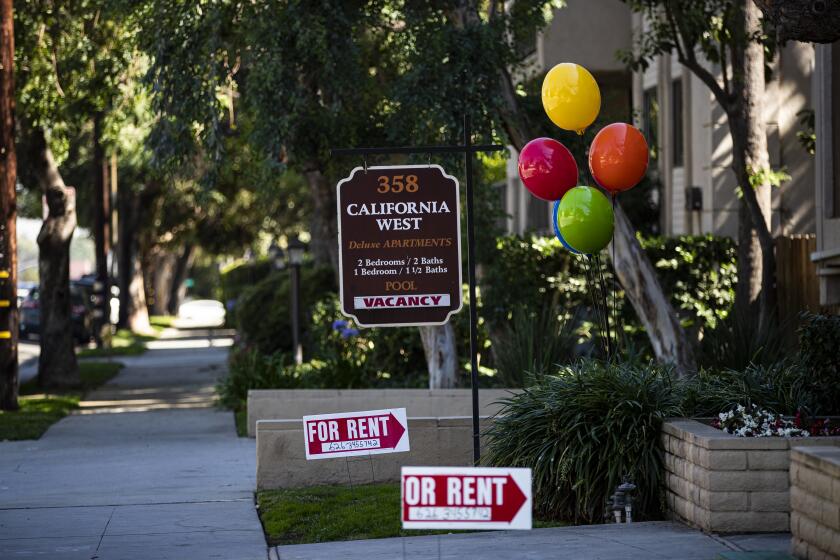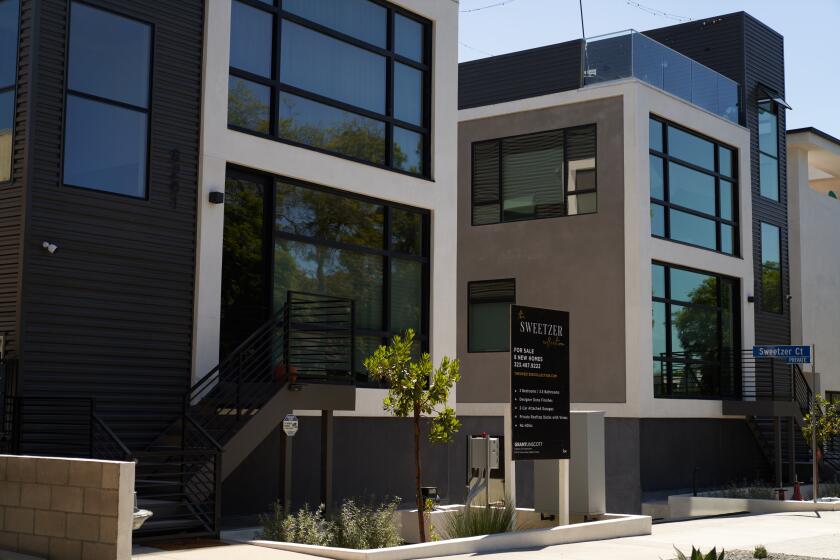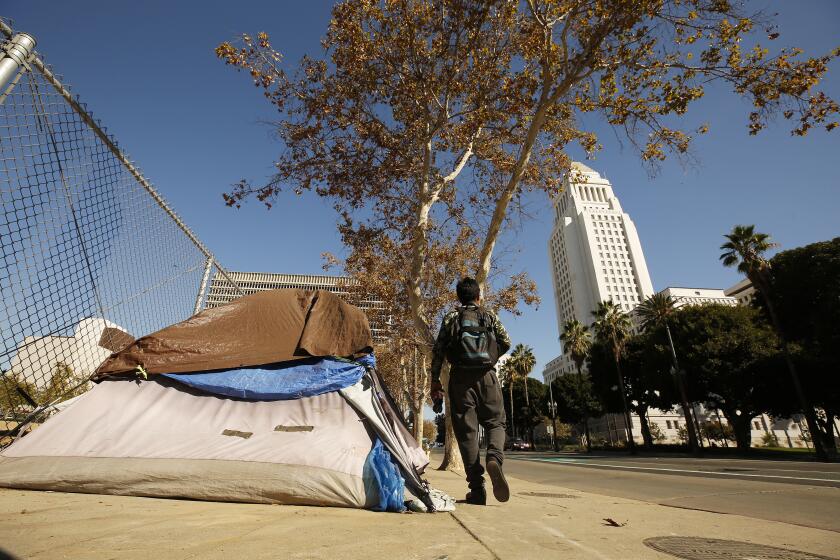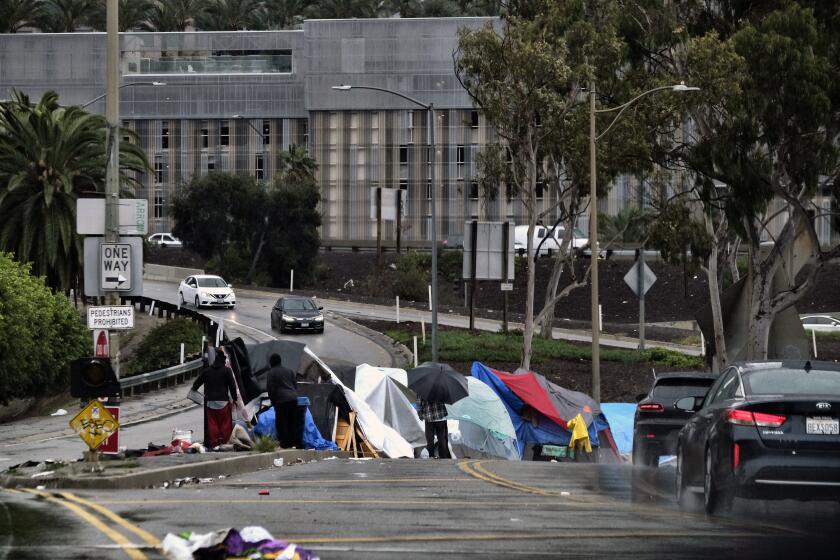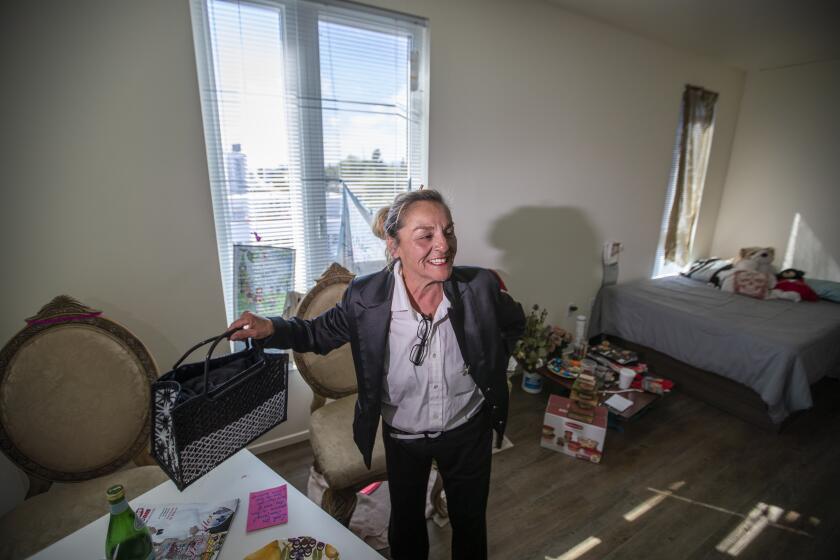Editorial: Are L.A. leaders trying to sabotage homeless housing in Venice?
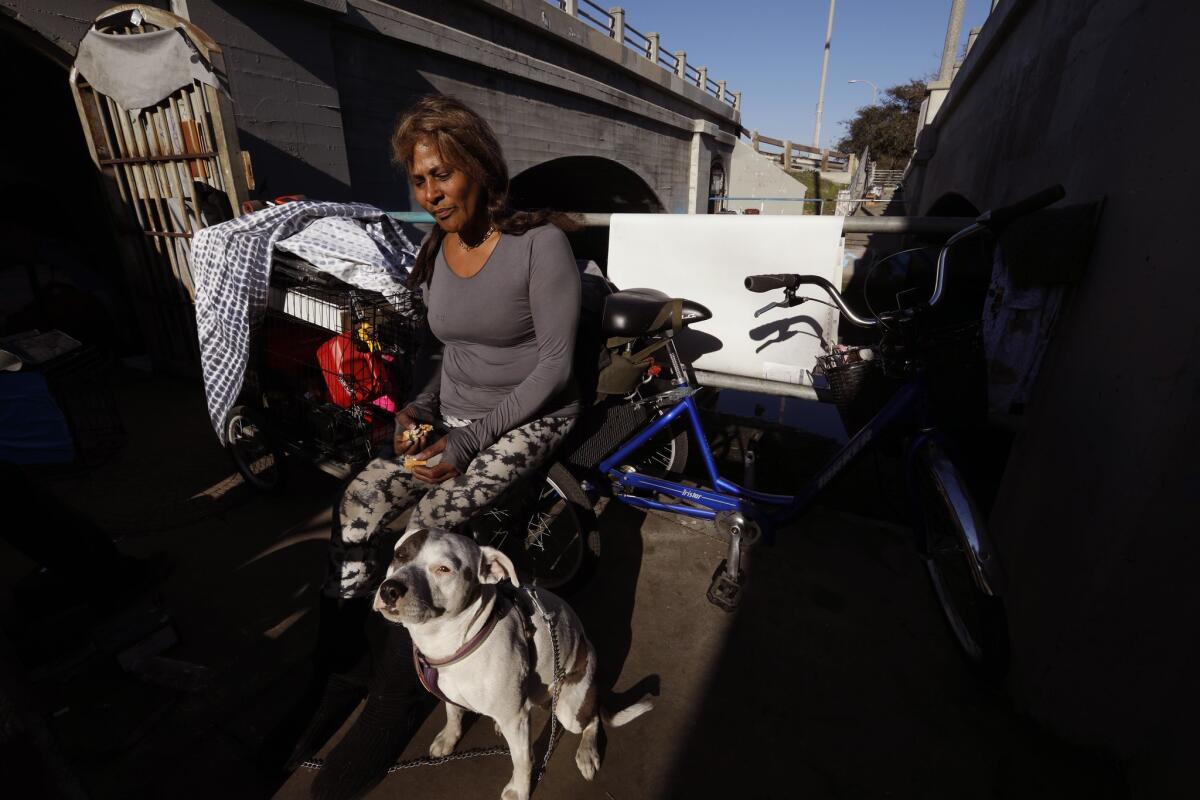
- Share via
Mayor Karen Bass has pledged to treat homelessness like the humanitarian crisis that it is and fast-track homeless housing. So why is she silent as the city attorney slow-walks, or possibly sabotages, a project for homeless and affordable housing on a city-owned parking lot in Venice?
The Venice Dell Community has been years in the making. The project site, a flat 2.65-acre lot a few blocks from the beach, is that rarity that Bass and other Los Angeles officials desperately seek — surplus city property, on the Westside no less, that can be turned into homeless housing.
Seven years ago the L.A. Housing Department requested proposals to develop the property. After competitively scoring the applicants, the City Council and then-Mayor Eric Garcetti approved an exclusive negotiating agreement with the nonprofit developers, Venice Community Housing and Hollywood Community Housing Corp.
Since then the developers have worked on the design, done community outreach, appeared at more than a dozen public hearings and secured necessary changes to land-use plans and zoning. At the request of neighbors, the developers lowered the building height and included ground-floor commercial space for local businesses. Roughly half of the 140 units are for homeless people, and the other half are for low-income individuals, with a quarter of the units set aside for low-income artists at the request of the community.
We want to hear how you navigated the costly housing market in L.A. Tell us your story.
Twice — in 2021, then 2022 — the City Council approved a development agreement that allows the developers to have site control and apply for funding. They already have $6.3 million from the city, federal housing rental vouchers, and a commitment of Los Angeles County Measure H dollars to cover case management services for the formerly homeless residents.
Along the way the project has garnered hundreds of supporters in Venice, but it also has hundreds of opponents, many of whom are vocal and litigious. One group has two lawsuits pending against the city and the developers.
Nonetheless, the developers have persevered and made progress.
Until now. In April, city officials in various departments stopped meeting regularly with the developers, saying in emails to Becky Dennison, the executive director of Venice Community Housing, that they were ordered to refer her to the city attorney’s office. The Bureau of Engineering stopped working with the developers on a contract to build two replacement parking garages and draft a construction labor agreement.
Zillow data show the median list price for homes in Los Angeles fast approaching $1 million. The top 10 major metropolitan areas in America for median listing price in June were all in California, according to a Times analysis.
Suddenly halted was the application for permission to start relocating and compensating tenants in a four-unit building on the project site that is owned by the city of L.A. and must be demolished. But the housing officials “refused to sign and submit it, based on direction from the city attorney,” Dennison wrote with frustration in a June 6 email to Assistant Senior City Atty. John Heath. It was one of several she wrote to Heath and shared with The Times. Heath wrote to Dennison twice in late April saying he would get back to her as soon as possible. Then he stopped responding to her emails, she said.
“Is the city attorney’s office going to respond at all to our inquiries?” she wrote to Heath in May. “Venice Dell Community is falling further and further behind as we wait.”
Heath declined to comment, as did a spokesperson for the city attorney’s office, saying they don’t comment on matters in litigation.
Los Angeles Mayor Karen Bass’ plan to call a state of emergency on homelessness could make a difference.
Here’s what we do know: A much-needed housing project that has been approved and reapproved by the City Council, that is six years into development, is being hamstrung by the city attorney, whose job is to facilitate the decisions of city leaders, not interfere with them. That is outrageous. Any delay in a project like this is costly. The process of relocating tenants could take a year, “and each month of delay impacts the project’s ability to secure tax credit financing and project a construction start date,” Dennison wrote to Heath in June.
Homeless and affordable housing projects in wealthy areas are almost always controversial. Councilmember Traci Park, who lives in Venice, opposed it during her campaign last year. City Atty. Hydee Feldstein Soto has also opposed the project. In a letter she submitted to the City Council in May 2022 before she was elected, she criticized it as an overly expensive pet project of outgoing Councilmember Mike Bonin. Heath, whom Feldstein Soto hired, is a proponent of the Our Neighborhood Voices Initiative proposed for the 2024 state ballot that would overturn several recent state laws designed to make it easier to build housing.
Whatever Feldstein Soto and Park may think of the project, it was approved by the City Council before they were elected and should not be undone now. City agencies’ refusal to interact with the developers — at the direction of the city attorney’s office — has already slowed the project by months. This is the opposite of everything Bass has ordered in her directives to fast-track permanent housing for homeless people.
Why haven’t all our efforts paid off yet? Several years of time and investment can’t begin to fix the underlying systemic problems that bedevil us.
In a statement to The Times, a spokesperson for Bass said: “The Mayor’s Office directed city departments to support the developer in submitting a critical funding application, which was submitted earlier this month.”
Homeless people shouldn’t have to spend weeks collecting proof of their Social Security numbers and poverty before they can move into apartments.
In fact, Dennison says, one agency did respond promptly to an email she sent it in early June requesting its signature on that application for nearly $50 million in state funding. What she needs is for the mayor to direct her other departments to resume working with Dennison.
The city’s delays mean the developers will probably miss a key deadline to apply for tax credits that are essential for funding the projects, which means construction may be postponed to the end of 2025 instead of 2024. So much for fast-tracking housing. Meanwhile, labor and construction costs go up each year.
“It is just frustrating and confusing because we have another project in Leimert Park that is being fast-tracked,” Dennison said. “This project is not being given access to the same level of resources and expediting.”
The project still needs approval from the state Coastal Commission; a decision is expected in October. And there are two lawsuits filed by the Coalition for Safe Coastal Development, a Venice-based nonprofit dedicated to fighting this project. The group argues, among other things, that the project will make the neighborhood susceptible to tsunami flooding.
When Bass came into office, she immediately ordered city agencies to expedite housing for homeless people. But in the case of the Venice Dell Community project, it looks as though city agencies are doing everything they can to slow down a housing project for the homeless.
If Bass is committed to homeless housing on city land, she needs to make sure city agencies work with this ambitious and much-needed project, not against it.
More to Read
A cure for the common opinion
Get thought-provoking perspectives with our weekly newsletter.
You may occasionally receive promotional content from the Los Angeles Times.
